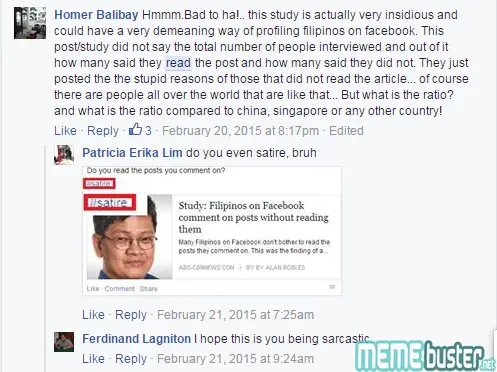Why do many Filipinos keep falling for satire news and articles, treating them as real news and even sharing them online?
According to a Rappler article written by Marguerite de Leon in 2013, “Why can’t many Filipinos tell truth from satire?” she noted how many times Filipinos have been fooled by satirical articles.
Filipinos have been fooled by satire articles, such as “Jinggoy Estrada Arrested After Trying to Smuggle Money Inside His Breasts to US,” “Harvard study finds that Filipinos are the world’s most gullible people,” and “CBCP trademarks the term Catholic,” among others.
De Leon also noted how the United States and the United Kingdom have embraced satire and enjoyed it for what it is, having consumed popular satire websites.
She wrote, “It’s possible, through a flawed educational system, that many Filipinos were not taught to think critically enough. And if you can’t think critically enough, grasping satire may be more difficult than it should be.”
De Leon commented on the alarming state of the education system in the Philippines as the country moves to a K to 12 program that crams more subjects in less time during class and how it lacks a proper science subject, which she notes is important since “a solid understanding of the scientific method goes hand in hand with critical thinking.”
She concluded that proper education will stop Filipinos from considering satire as truth and “prevent the unsavory events that inspire satire to begin with.”
[ads1]
“Ridiculous” real events and Facebook consumption to blame too?
However, some Reddit users pointed out that there are lacking points in de Leon’s Rappler article.
Reddit user @SubversiveMustache noted, “A problem with satire in the Philippines is that factual, everyday news can be just as ridiculous.” The user then enumerated how Manny Pacquaio was then a member of Congress, how Erap Estrada still finished second to last in the 2010 presidential elections, and more. Local satire news may not be very well-written or may be too well-written and how satire may not just be a fitting genre for the Filipinos, the user added.
Another user @Grease-Lihgtning said that Filipinos often mistake satire articles from SoWhatsNews and MosquitoPress because of their “attention grabbing,” “ridiculous” headlines, which are immediately posted on Facebook. The user added how Filipinos often use Facebook: “check status, like, share, comment, scroll down… (Read the article? Nobody’s got time for that!)”
6 in 10 people will share link without reading its content, study says
The Washington Post covered a new study by computer scientists at Columbia University and the French National Institute, which showed that 59 percent of links being shared on social media have never been clicked. This meant that people who retweeted and shared news did not read it.
The article noted how this habit of using social media has led to the increase in the use of sharebait, the proliferation of Internet hoaxes, and the “lack of intelligent online discourse” when it comes to complicated and controversial topics.
The Washington Post article came a few days after satirical website Science Post pulled off its “lorem ipsum” gag with a shocking headline: “Study: 70% of Facebook users only read the headline of science stories before commenting.” The article served to prove its headline’s point after it was shared by almost 46,000 people. It showed that indeed, Facebook users did not read the article, which contains only one paragraph of actual writing, while the rest was filled with “lorem ipsum” text.
Those who do read the content also have to deal with another hurdle – understanding it. As what Alan Robles’ satire article “Study: Filipinos on Facebook comment on posts without reading them” said, there are also commenters who read the content of the post but fail to comprehend what it is saying. And he has a point!
True enough, there are several netizens who read Robles’ article and reacted negatively to it.


Now, if you enjoy satirical articles and you want to share them with your friends on social media, you might have to do what ABS-CBN did with Robles’ article – put #satire on your post, or announce in any way that you’re sharing satirical news. That way, no one would misinterpret it and share it without reading, thinking that whatever the satirical article is claiming must be true.
Sources: (rappler.com, sowhatsnews.com, mosquitopress.tumblr.com, filipinofreethinkers.org, reddit.com, washingtonpost.com, thesciencepost.com, k2.abs-vbnnews.com)
Be Informed. Beat the Trolls, Share the Truth!
[ads3]


